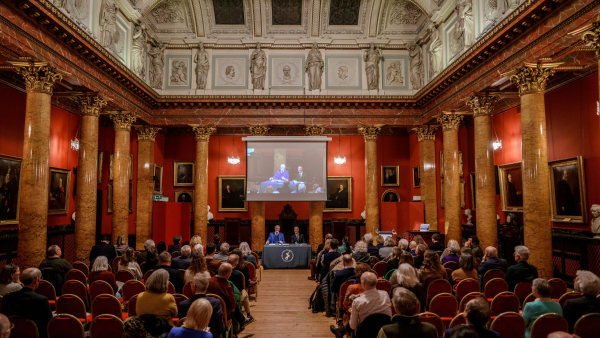This is the eighth in a series of posts about ‘coordination theory’, a set of ideas about human motivation, organisational and social change. The first four posts set out key aspects of the theory. Posts five and six respectively described situations in which one of the active forms of coordination is dominant (‘monocultures') and where one form is underarticulated (‘deficit cultures’). In the last post I began to explore the nature and characteristics of the forms of coordination, starting with ‘individualism’.
In this post I turn to ‘solidarity’, arguably the form that brings out both to the best and the worst parts of our characters.
In an organisational meeting or political debate when someone appeals to the common interests, calls for respect for tradition, argues that our actions must be based on some idea of justice, the power of solidaristic motivation is being summoned.
The foundation of every form of coordination lies deep in us and each is complex, but solidarity is perhaps the form with the most powerful pull on our imagination and which summons up the widest range of responses. Harnessing solidaristic sentiment is fundamental to the success of organisations, movements, and societies, but, like each form of coordination, must be wary of its dangers and excesses.
In an organisational meeting or political debate when someone appeals to the common interests, calls for respect for tradition…the power of solidaristic motivation is being summoned.
Today the fracturing of solidarity is central to many accounts of what has gone wrong in western liberal democracies. For the left this is result of inequality, exclusion and the imposition of market principles into every corner of life. For populists, mainly on the right, it is the consequence of global elites spurning the values and needs of ordinary people disregarding the importance of national identity and pride, putting the interests and demands of minorities and outsiders above those of kith and kin.
The power of solidarity derives from what we have in common as members of a group. For the advocates of solidaristic, our inter-connectedness and similarities should be the foundations for why and how we act. Whereas individualism drives us through some sense of self-interest, and hierarchy shapes us through compliance to authority, solidarity draws upon shared values. It is underpinned by the principles, tacit or explicit, which lead us to weigh the needs of the group in balance with our own. These principles range from the broad and ethical – such as our duty to care for the weakest members of the group – to the specific and symbolic – the performance of certain rituals - or the avoidance of prescribed activities, such as drinking alcohol or eating certain types of food.
An emphasis on the needs of the group is what can make solidarity compelling. Yet while it is the form that most often appeals to idealism, it also demarcates boundaries between the in-group and the out-group, virtue and vice, sacred and profane. Adherence to these boundaries can lead to irrationality and resistance to change and, at their worst, to inhumane and even murderous excess.
An emphasis on the needs of the group is what can make solidarity compelling. Yet while it is the form that most often appeals to idealism, it also demarcates boundaries between the in-group and the out-group
We evolved as solidaristic animals. In many ways it is our group-based social skills that mark us out as a species. Hunting for food and dealing with adverse conditions such as sickness or food shortages are done more efficiently when group members trust each other and are willing to make sacrifices for the common good. Other species may be faster, stronger, more resilient to nature but, arguably, none are as socially adept as we are.
But although it has been the form we have most relied on as a species, solidaristic expression in the modern world often feels unrooted, arbitrary and volatile. We evolved in small, closed, homogeneous groups with fixed identities and roles but find ourselves living in teeming, diverse, modern cities in which not only the population constantly changes, but also the groups we find ourselves in and choose to belong to.

On the surface we appear to have survived this decline in the salience of solidaristic affiliation, and in many ways thrived. This appearance has contributed to an implicit assumption that much solidaristic expression is either unimportant or problematic. Indeed, an ability to transcend certain forms of solidaristic belief and behaviour, whether religious devotion or class affiliation, came to be seen in the West as a sign of modernisation, while a failure to do so elsewhere has been portrayed as evidence of a lack of development.
Yet, while the call of solidarity may have been muffled, it has never lost its potential to mobilise. The rise of populism and nationalism and the resilience of religious belief are among the reminders that solidaristic sentiment and mobilisation is an intrinsic and eternal part of human imaginations and social organisation. When organisational leaders emphasise teamwork and shared purpose, they are seeking to summon solidaristic energy. Concern about our deteriorating mental wellbeing, manifested in epidemics of loneliness and depression, may point to our solidaristic yearning as individuals.
Like the other forms of coordination, solidarity is complex. One way to appreciate its nature is to explore some of its key dimensions. In this post I focus on three: belonging, ‘the sacred’ and justice.
Belonging
Solidarity emerges from the bonds between people and our sense of group membership, whether the group we identify with is our immediate family, our nation or the whole human race. However, being in a group does not always lead to solidaristic sentiment or action. Group membership can be objective or subjective, ascribed or chosen. I am a White, middle aged, middle class Englishman who lives in South London, usually votes Labour and supports the football team West Bromwich Albion. Some of these groups I entered at birth, some I chose to join, some were by-products of other life decisions.
Whether my membership of a group leads to a solidaristic response depends on the nature of the group and its salience in specific social contexts. I have an irrational, but unashamed, predisposition to like West Brom fans, but living in SW4 feel particularly loyal to other South Londoners. Like many middle-class liberals my occasional sport-induced bursts of patriotism are balanced by universalist suspicion of nationalism. That said, if I happened by coincidence to meet someone from my neighbourhood while sitting in a bar on the other side of the world, I might feel our similar home address created a bond. Solidarity only becomes manifest when being a member of a group generates a sense of meaning and belonging.
We are born into multiple layers of affiliation, from the family to the nation, but unexpected events and major changes can also forge or strengthen solidaristic groupings. There is, for example, the evidence of communities pulling together during and after natural and man-made disasters. From the citizens of London and Dresden being bombed in the Second World War to survivors of the Indian Ocean Tsunami and Hurricane Katrina, researchers find time and again that rather than devastated communities collapsing into anarchy and lawlessness, the more common pattern is for existing divisions based more on hierarchy or self-interest to be replaced by a collective effort to survive and look after the most vulnerable. In the millions volunteering for the NHS, Thursday clapping and Captain Tom we saw more evidence of the way crisis can bind in our responses to the Covid-19 pandemic.

Studies also find communities facing common and shared crises tend to exhibit surprisingly high levels of wellbeing (although this does not seem to have been the case with Covid-19, perhaps because of the isolating effects of lock down). In an influential paper written in 1961 social researcher Charles Fritz, who had undertaken participant observation in Blitz-torn London, asked an attention-grabbing question: “Why do large-scale disasters produce such mentally healthy conditions?” Fritz suggested an explanation: “As social animals, people perhaps come closer to fulfilling their basic human needs in the aftermath of disaster than at any other time because they develop a form of life highly compatible with these needs”.
Disasters can temporarily recreate the day-to-day experience of our prehistoric ancestors. Their groups were profoundly interdependent, largely subsisted hand to mouth and were highly vulnerable to the vicissitudes of nature. In modern western society we spend a great deal of effort and money trying to avoid the kind of disasters that were a constant risk for our prehistoric forebears and still dog the lives of those in the poorest parts of the world. Then, from taking mind altering drugs to going on adventure holidays, many go to great lengths to try to manufacture the intense feelings and bonds that crisis can generate.
Managers know that if people feel affiliated to a group that they are inclined to follow its norms and expectations voluntarily. Group affiliation encourages a magic ingredient of human interaction: trust.
Much effort goes into trying to manufacture a sense of belonging. Organisations, whether governmental, business or civic, need to persuade people to behave in ways which align with their goals. The hierarchical approach is to use the compulsive power of authority in its various forms. The individualist approach is to encourage competition and offer incentives. Both methods have costs and dangers. But managers know that if people feel affiliated to a group that they are inclined to follow its norms and expectations voluntarily. Group affiliation encourages a magic ingredient of human interaction: trust.
The correlation between trust on the one hand, and wellbeing and performance on the other, has been found everywhere from schools and businesses to neighbourhoods and entire countries. Equally, while hierarchical control and self-interest are generally seen as neutral ideas and sometimes as negative, the value-based, altruistic aspect of group affiliation explains why we tend to see solidarity as a virtue. Speaking to a wide variety of organisations in different sectors, I have often been struck by how they insist their success is based not on imposed rules or material incentives but by the claim that the organisation is a close knit team sharing the same values based mission. Solidarity is the form of coordination that summons up shared values and group morality. Indeed, political progressives are inclined to claim solidarity as the expression of their philosophical orientation.
But there is another side to belonging and loyalty. As Joshua Greene says in his book Moral Tribes: “Morality evolved to enable cooperation, but this conclusion comes with an important caveat. Biologically speaking, humans were designed for cooperation but only with some people”. An array of social psychology research has confirmed ‘in-group bias’, our tendency to be systematically more inclined to be understanding and generous toward people we perceive to be in our group than those who are not. Experimenters find this is true not only for pre-existing group identities such as nationality, but for much less significant factors. In what are called ‘minimal group studies’, people display in-group bias when the basis for group identity was no more than an initial coin flip.
Leaders of organisations and nations often exploit the motivating power of the out-group on a grand scale, projecting the threat of an enemy at the gate, whether dangerous people or dangerous ideas, as a way of cementing loyalty to their own rule. Cover-ups following misbehaviour are often justified with the argument ‘whatever we have done wrong we shouldn’t let our mistakes provide ammunition for our competitors or critics’.
Yet, however strong solidaristic motivation is in all of us, there is no question that the social context in which it is felt and expressed has shifted. First, the greater diversity of populations means we are much more likely than our antecedents either to know directly or know about people from other groups. Second, identity is less often fate. Despite the continuation of social norms, biases and inequalities, our inherited identity – whether ethnicity, nationality, class, nationhood and even gender – is less determining of our other characteristics and life choices than it used to be. The decline in the importance of class in voting patterns, the progress of women in education and employment, and the growth of mixed marriage are all examples of how social change and individual choice have started to trump what would until recently have been seem as deep-seated group-based human dispositions.
Third, identity has become more matter of choice. Whereas once our social image was largely inherited and fixed, today we have an ever-expanding list of opportunities to define and redefine our own group identity. Whether joining or leaving a religion, buying a football season ticket, following a type of music, taking up a hobby, changing employment, joining a single-issue campaign group, or even changing gender, we are offered every day avenues to move closer to one group of people while, implicitly, separating ourselves from those outside this new affiliation.
The aggregate effect of these shifts has been to make group affiliation weaker and more diffuse as a motivational force than it has been throughout most of our species’ existence. However, rather than acknowledging our solidaristic needs, in our individualistic culture the idea that people think or behave based on group affiliation, rather than dispassionate calculation, has generally been deprecated. To the tribe of western liberals (not that they would see themselves as a tribe) it is a good thing to be an independent or free thinker, and a bad one to be traditionalist or conformist. Until recently, the leaders and champions of liberal democracy have tended to treat our solidaristic motivations as if they have become peripheral to social order and progress.
There is now a concerted backlash against this view both from populists seeking to exploit social division and from liberal apostates, who have come to see the idea that we can transcend groups in favour of melting pot universalism as psychologically insensitive and politically naïve. Footloose global elites lacked interest or empathy towards those who found their sense of identity and belonging undermined by modern trends and attitudes. The result of this indifference – what I call a ‘solidarity deficit’ – can be seen in today’s volatile and angry political culture.
When people’s desire to be part of a group and to enjoy the connection, security and trust that offers is disparaged, that desire does not disappear. It may even become more resentful and volatile. It has been argued that a major polarising force in modern society is between those who can and want to be promiscuous in choosing what groups to belong to, and those for whom fixed belonging feels more inevitable and natural. David Goodhart’s dichotomy between ‘somewheres’ and ‘anywheres’ may be overplayed, but it quickly entered public discourse.
In a world in which liberalism has felt be to be in retreat and nationalistic populism on the rise (although the shift from Trump to Biden may mark a turning point), we can attribute much of that reversal to the failure of the former President to recognise the nature and power of belonging. as well as the ruthless ways the exponents of the latter exploit our longing to be in one group and against another.
Modern citizens may sometimes be surprised by the degree of influence exercised over their attitudes and behaviours by group membership.
Equally, wise organisational leaders will acknowledge not only the importance of shared purpose to motivating employees but also of the bonds that encourage team members to go the extra mile for each other. The degree of social support is one of the most important factors shaping people’s experience of work. We may think soldiers risk their lives because they are following orders or believe in the struggle, but they more often attribute their bravery to the bonds with their comrades in arms.
Modern citizens may sometimes be surprised by the degree of influence exercised over their attitudes and behaviours by group membership. Even more counter-intuitive is another distinguishing aspect of solidarity; the enduring power of the sacred.
The sacred and the profane
 By ‘sacred’ I do not exclusively mean religious. The holding and not holding of a range of beliefs, and their embodiment in rituals is often an important marker of the boundary between group insiders and group outsiders. At the risk of triviality, let me suggest an example based on my support for a football team.
By ‘sacred’ I do not exclusively mean religious. The holding and not holding of a range of beliefs, and their embodiment in rituals is often an important marker of the boundary between group insiders and group outsiders. At the risk of triviality, let me suggest an example based on my support for a football team.
As a fervent fan of West Bromwich Albion, I might find myself sitting at a match next to someone with whom I have little in common. It could, for example, be a young working-class woman who is a member of the Conservative Party and a practicing Christian. But, together in our home stadium the most important thing is our shared affiliation.
Chatting to this woman I may notice the many things making us different to one another. I might disagree with her social attitudes and she might disapprove of my lifestyle. But, in this context, we would likely be less affected by these differences than if either of us was to do something that defied that affiliation. If, for example, my fellow supporter was to tell me she had put a bet on a West Brom defeat, or whispered to me that she was thinking of switching her support to one of our local rivals.
Later, relating my experience to other West Brom fans in a bar, the features of this woman that would attract opprobrium would not concern the social or political differences between her and others in the group, but the way she had infringed the rules concerning the thing we shared: our love of our club.
To understand what is going on here we can draw on the work of Émile Durkheim, one of the founding fathers of sociology, and someone fascinated by religious belief. In looking at the practices of remote tribes who had been largely unaffected by modern civilisation, he sought to get to the essence of faith. He started out assuming two features were essential to defining a thought system as a religion: belief in the supernatural or belief in active Gods. He found these to be common aspects of faith but, on closer inspection, that neither was essential or universal. Instead Durkheim identified a distinction that he said existed in all religions; between the sacred and the profane.
Durkheim defined the sacred as things, and beliefs about those things, on which the religion has clear and hard rules. This is the domain of rituals, things believers must do (like the taking of Mass by practicing Catholics), and taboos, things they must not (like the eating of non-Halal meat by observant Muslims). In cultures suffused with religious meaning, the profane will be those things that are seen to be of a lower and lesser status than the sacred and which must therefore be clearly separated from the sacred for fear of pollution. In less religious contexts the definition is simply those things not seen as salient to faith.
Over recent years researchers in various fields have been rediscovering the enduring importance of sacred beliefs to our moral outlook and social behaviours. As social psychologist and commentator Jonathan Haidt has shown, this way of thinking continues to powerfully influence the judgements of educated western citizens. To test this, he asked a range of people who would define themselves as broadly liberal in their outlook to consider carefully constructed hypothetical behaviours that had no human victim. These included having sex with already dead animals, privately and secretly desecrating national or religious symbols or indulging in extreme but entirely voluntary sadomasochism. The examples were constructed so none infringed the liberal principle that people should be free to do whatever they want so long as it doesn’t harm anyone else. Yet, despite these behaviours being private and having no victim, the respondents generally responded with disgust. It is illustrative of how liberals like to imagine we have put sacred beliefs behind us that, when asked to explain their reaction, the respondents tried in vain to find logical reasons for their response. They reacted as a believer would to a taboo, but modern values required them to find some other rationalisation.
The anthropologist Scott Atran, who has studied the background and motivations of extremists and terrorists, has suggested another way of defining sacred beliefs. They are beliefs that – were we to be subject to incentives, pressure or even evidence designed to make us abandon them – we would only adhere to more strongly. Atran and his colleagues developed the concept of ‘the backfire effect’ to describe how attempts to change people’s minds and actions by using either the individualistic method of offering incentives or the hierarchical one of issuing instructions only cements their solidaristic determination. As Atran has written: “Whether for cooperation or conflict, sacred values, like devotion to God or a collective cause, signal group identity and operate as moral imperatives that inspire non-rational exertions independent of likely outcomes”.

Atran’s observation is also a reminder of one of the most famous observational experiments in social psychology, ‘when prophesy fails’, undertaken by Leon Festinger and colleagues in 1954. Festinger joiner a religious doomsday cult in Chicago called the Seekers, whose leader had named a specific date for the end of the world. When the prediction failed to materialise, the religion’s adherents faced what he dubbed ‘cognitive dissonance’: the holding of two contradictory things in one’s mind. One might expect the absence of a confidently predicted and promised reckoning to cause doubt and grief amongst followers; surely objective evidence would lead them to lose their faith? In fact, the cult members were more likely to reassert their beliefs. As Festinger put it, after the failed prophecy, “faith was boundless and their resistance to disconfirmation sublime”.
What liberals call ‘common sense’ is a form of conditional utilitarianism; a reason-based calculation of the public interest tempered by a commitment to civil liberties and the rule of law. Yet, despite our claim to rationality, much contemporary political debate can only be fully understood as an attempt to categorise things in and out of the sacred realm. For some it is religion that should command our uncritical and total commitment. For others it is the elimination of poverty or the protection of the planet. Responding to our current solidarity deficit and its effects, philosopher and former Israeli politician Yael Tamir is among those who argue that the nation as a sacred source of identity is more inevitable, benign and inclusive than liberal internationalists like to imagine; “…rather than seeing nationalism as the last refuge of the scoundrel we should start to think of nationalism as the last hope of the need”. Whilst campaigners offer rational or instrumental arguments to buttress their view, they see their position, ultimately, as a moral imperative. In the distant past in certain cultures, human sacrifice was a sacred requirement, in the 20th century a concerted and largely successful international movement sought to give human rights the status of universal truths and non-negotiable imperatives. There are now movements calling for nature to be accorded rights, while futurists are exploring the potential legal protections for tomorrow’s intelligent machines.
Sacredness is not just about taboos or group claims. The roots of the idea, and of the human need it expresses, extends into what we might term the transcendent. This relationship to the sacred means solidarity is the motivation most associated with those things that have meaning for us but which, at heart, defy rational explanation. This pertains not just to faith or non-religious spirituality but also the sense of connection, inspiration or awe that can be summoned by nature or art, and the hold of heritage and tradition on our affection and imagination.
Today’s rituals are to be found at the music festival, in the concert hall and at the football ground, as much as in church or in pageantry. Any politician or marketing advisor knows the importance of certain symbols of national and community belonging and identity. The idea of brand in marketing may be most strongly associated with external communication but thoroughgoing branding exercises also involve trying to summon up an almost sacred commitment to behaviours and values within in an organisation. When liberals implicitly underestimate or disparage the irrationality of sacred belief, they simply leave a space ready to be filled by those who better understand its appeal and power.

Acknowledging the sacred also helps to explain why a solidaristic perspective is often associated with suspicion of change. Although all groups and traditions start somewhere, generally we do not choose the sacred meanings that are tied up in-group affiliation; they are a predetermined part of belonging. So, solidarity is the world-view most focussed on respecting and preserving the past. This is not to say that its advocates make no case for change; after all, the call for revolution is generally grounded in solidaristic terms. But it is noticeable that even when solidarity provides the voice for radical ideas and movements it often does so through reference to reclaiming something lost, or renewing something tarnished. The identity of the climate movement is deeply rooted in conserving and preserving. Contemporary socialists regularly call back to the New Deal and the birth of the welfare state for inspirational material and policy proposals. On the opposite end of the political spectrum we need look no further than the Brexit rallying cry ‘take back control’, or Donald Trump’s vow to ‘make America great again’.
Solidarity is the world-view most focussed on respecting and preserving the past…it is noticeable that even when solidarity provides the voice for radical ideas and movements it often does so through reference to reclaiming something lost.
Justice
A third core aspect of the solidaristic form – reciprocal or group justice – has a more modern feel. Solidarity generally assumes and rests upon group members’ responsibilities to abide by understood and agreed principles. These rules are often reinforced through authority or incentives but in successful groups they rely on being internalised as values. The emphasis on notions of justice within solidaristic discourse is part of what can make it compelling and mobilising, but also, sometimes, problematic.
Our commitment to some idea of fairness is apparently bred in the bone. Research involving very young children shows that humans have what may be termed a fairness instinct. For example, when one toddler is given three marbles and the other just one the majority of the former will offer up one of their marbles to their playmate. In another famous set of experiments Yale psychologist Paul Bloom showed babies short presentations of ‘characters,’ which were little more than the outline of shape with eyes. In the control experiment one of the shapes attempts to complete a task, typically climbing up a hill. In another version other shapes either help them up the hill or push them down. The babies spent significantly more time looking at the shapes that helped than those that hindered, which the experimenters took as evidence for an innate preference for altruism.
Group justice is arguably society’s single most important and most debated ethical principle. Those speaking from a solidaristic perspective do not have a monopoly on its appeal. It also has hierarchy-friendly rationale, emphasising the role of fairness in legitimising authority or strengthening institutions, and an individualistic case, which focusses on the claims of each person and the universal right to autonomy.
The solidaristic idea of justice is grounded in the popular will and the collective needs of the group. Sometimes this perspective implies advocacy of greater egalitarianism or redistribution, but there is another kind of solidaristic justice. Often people value the ideal of social equality less than what political philosophers call ‘procedural justice’, which is based on everyone in the group abiding by agreed rules.
I became acutely aware of this many years ago as a Labour Party canvasser in working class areas. Hoping to tap into concern about the social injustice faced by the unemployed and poor, I soon found what animated people ‘on the doorstep’ was the perception that many people on welfare were either work shy or benefit cheats; fairness mattered; but fairness in terms of the rules of the group not the metrics of inequality. Before we deprecate such attitudes, we might think about how often we care more about rule infringement than absolute justice. We might feel general sympathy for the plight of the homeless person we pass in the street, but have a more visceral response to the person who pushes in front of us in a queue or who insists on taking loudly on their mobile phone in the ‘silent’ carriage of the train.

Overall, the emphasis on group justice adds to the strength of solidarity. The potential qualities of group affiliation – the motives that can drive social action, such as self-sacrifice and trust – are likely to be enhanced when group members feel the group operates in ways that are fair and agreed. Surveys of staff satisfaction – which is strongly linked to performance - invariably ask questions about whether people see their organisation as fair. The pursuit and defence of justice is a powerful motivator.
However, notions of justice can also be contested: for example, when those who prioritise procedural justice argue with those who emphasise distributive justice, both are inclined to claim absolute moral authority. This can stand in the way of resolving disputes or identifying workable solutions. Debates about fairness can become dances on the head of pin. I have also seen organisations, particularly in the charity sector, where more energy seems to go into tackling small alleged grievances among staff than addressing the organisation’s mission in society.
Groups animated by solidaristic concerns may spend too much time arguing over the relative sizes of the slices of cake, when they might be better served by potentially more hierarchical or individualist methods of making the pie bigger.
As their critics often argue, groups animated by solidaristic concerns may spend too much time arguing over the relative sizes of the slices of cake, when they might be better served by potentially more hierarchical or individualist methods of making the pie bigger. Equally, if notions of justice are premised on a sharp distinction between in-group and out-group entitlement, they can provide moral cover for bigoted and inhumane behaviour. The populist nationalism of politicians, such as Premier Victor Orban in Hungary or the ruling Law and Justice Party in Poland, combine a commitment to social inclusion for the ‘true citizenry’ with hostility to immigrants, outsiders and international institutions.
The irony – often tragic – of solidarity is that while it prizes human bonds and communality it is also the form of coordination most connected to polarisation, both in nations and smaller groups. Why? First, there is first the emphasis on the interest of the group. Both left radicals and right populists, but also radical reformers in any institution, tend to claim special insight into what ‘their’ people want and need. Anyone elected to office claims to represent the interests of those they lead. But the populist sense of directly channelling the people’s will differs from the representative model of liberal democracy or the claim of disinterested hierarchy, that leaders have the responsibility and the right to mediate between the popular will and the objective interests of the nation or place.
Secondly, there is solidarity’s moral dimension. The identification of unfairness and the promise to correct injustice is invariably at the heart of solidaristic narratives. Anyone advocating political or organisational change is, by definition, promising to make things better. However, neither the hierarchical nor the individualist case for change relies as powerfully or inherently as does the solidaristic on the idea that something has gone badly awry. The message of populists tends, on the one hand, to reinforce pessimism about the world as it is while, on the other, rejecting complexity by arguing that the root causes of problems lie not in the genuine challenges and difficult trade-offs, but the perfidy of the elite. In a forensic critique, Chris Clark has identified the three myths which he says make up the world view of the populist left; ‘the dark night’, ‘the puppet master’ and ‘the golden age’; respectively the idea that political opponents are not just wrong but evil, that all misfortune in the world is the result of deliberate action by bad people, and that – in the absence of socialism – little or nothing is improving.
There is much that is wrong with the world. The solidarity deficit is real and, given the nature of the modern world, to some degree inevitable. Moral conviction can be a powerful human motivator and driver of change. Leaders will seek to motivate those they lead by claiming that their nation or organisation is on the side of virtue. But because the populist/solidaristic claim about change tends not simply to be that things could be better, but that something morally unacceptable must be corrected, it leads inevitably the rhetoric of blame. Those who have got things wrong cannot have done so simply because of well-meaning error, they must have corrupt motives and hidden interests. This contributes to polarisation and which, in a sense, depoliticises disagreement by making it intractable. As Harvard University political philosopher Michael Sandel has said moral outrage can be politically energising, but only if it channelled and guided by political judgement.
Group membership and moral conviction go toward the third characteristic of much solidaristic disputation; its visceral nature. In his book Nervous States. Will Davies asks why the social and political discourse of societies like the US and UK feel more anxious and volatile. His explanation implicates the breakdown of two distinctions, which he argues were central to the Enlightenment project. The first is between war and peace as we have become used to continuous conflict, ranging from terrorism to nationally sponsored cyber-crime, which destabilises society but falls short of an explicit state of war. The second is between the mind and body as we have both acknowledged and, arguably succumbed to, the idea that feeling is as important as reason as the basis for behaviour and attitudes. Solidaristic politics is one in which emotion is not only the equal of reason, but a greater imperative.
In the last two posts I have explored the character of individualism and solidarity. The dynamism of the former but also its contradictions and excesses; the enduring importance of the latter and how it can inspire the best and worst of human behaviour. The role of the third form, hierarchy, is often to mediate between the two sets of imperatives; the call for freedom and the demand for justice, the impulse for change and innovation the need for belonging and attachment. It is a hard task, but, as I will explain in the next post, those who control hierarchies always have their own agenda.
A new framework for change (19 May, 6-7pm BST)
In his final RSA Chief Executive’s lecture, Matthew Taylor is joined in conversation by author, entrepreneur and CEO Margaret Heffernan to explore the core elements and implications of ‘coordination theory’ – a set of ideas he has been developing and refining for over a decade.
The event will be an interactive webinar and tickets are free but limited, so book early to avoid disappointment.
19 May, 6-7pm BST | Online via Zoom
Related articles
-
The 2024 Angus Millar Lecture
Fellowship news
Fionna Monk
The 2024 Angus Millar Lecture was led by award-winning novelist Andrew O’Hagan on the theme of 'Art, Literature and Truth in the Era of Fake News, Algorithms and Artificial Intelligence'.
-
Facing the future: Scotland's challenges
Fellowship news
Fionna Monk
On 26 November 2024, RSA Scotland discussed Scotland’s future with nine engaging speakers addressing various challenges facing the country. The venue was resonant – a former committee room at the French Institute used in its early days by the Scottish Parliament. This successful event was chaired with deftness and humour by the former Presiding Officer at the Parliament, Rt Hon Ken Macintosh.
-
Improving health through economic development
Report
Anna Markland Liv Chai Nicholas Heslop
The RSA have created an Economies for Healthier Lives Programme Coaching Resource that pulls together our experience, insight and case studies from the five ‘Hubs’. This resource is designed to support those looking to learn from and replicate this work to get supported at every stage, from project inception through to legacy planning.





Be the first to write a comment
Comments
Please login to post a comment or reply
Don't have an account? Click here to register.